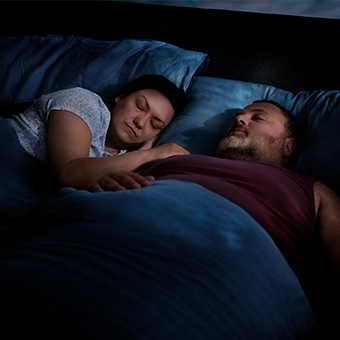
For moderate-to-severe obstructive sleep apnea (OSA) in adults with obesity
Get to know Zepbound
A breakthrough treatment for OSA*
*Along with a reduced-calorie diet and increased physical activity.
For moderate-to-severe obstructive sleep apnea (OSA) in adults with obesity
Get to know Zepbound
A breakthrough treatment for OSA*
*Along with a reduced-calorie diet and increased physical activity.
See how Zepbound could help
With moderate-to-severe OSA, breathing during sleep may be interrupted over and over, which may disrupt sleep. That's where Zepbound might be able to help.
Breathe better during sleep


*Along with diet and exercise.
†After 1 year, adults taking Zepbound (10 mg or 15 mg) saw breathing interruptions reduce by 25.3/hour (vs 5.3/hour with placebo) and by 29.3/hour on Zepbound + continuous positive airway pressure (CPAP) (vs 5.5/hour with placebo). Starting averages were 46.1-53.1/hour.
What is Zepbound?
Zepbound is an injectable prescription medicine that may help adults with moderate-to-severe obstructive sleep apnea (OSA) and obesity to improve their OSA. Zepbound should be used with a reduced-calorie diet and increased physical activity.
- Zepbound contains tirzepatide and should not be used with other tirzepatide-containing products or any GLP-1 receptor agonist medicines.
- It is not known if Zepbound is safe and effective for use in children.

*Along with diet and exercise.
‡At 1 year, 42.2% of adults taking Zepbound (10 mg or 15 mg) achieved remission or mild OSA with no symptoms (vs 15.9% on placebo). Among those on CPAP, 50.2% of those taking Zepbound achieved remission or mild OSA with no symptoms (vs 14.3% on placebo). Starting averages for breathing pauses were 46.1-53.1/hour.
Select Safety Information
Do not use Zepbound if you or any of your family have ever had a type of thyroid cancer called medullary thyroid carcinoma (MTC) or if you have an endocrine system condition called Multiple Endocrine Neoplasia syndrome type 2 (MEN 2), or if you have had a serious allergic reaction to tirzepatide or any of the ingredients in Zepbound.
Additional results:

When breathing is disrupted during sleep, blood oxygen levels may decrease. With Zepbound (10 mg or 15 mg), the level and the time of reduced blood oxygen while sleeping (called hypoxic burden) improved.*§
*Along with diet and exercise.
§In a 52-week study, adults taking Zepbound (10 mg or 15 mg) had a starting average hypoxic burden of 153.6% min/h that was reduced by 95.2% min/h (vs a starting average of 137.8% min/h that was reduced by 25.1% min/h with placebo). In another 52-week study, adults taking Zepbound (10 mg or 15 mg) + CPAP had a starting average hypoxic burden of 132.2% min/h that was reduced by 103.0% min/h (vs a starting average of 142.1% min/h that was reduced by 41.7% min/h with placebo).

People taking Zepbound (10 mg or 15 mg) lost about 50 lbs (20%).*||
Individual results may vary.
Zepbound is not for cosmetic weight loss.
*Along with diet and exercise.
‖In a 52-week study, adults taking Zepbound (10 mg or 15 mg) had a starting average body weight of 257.2 lbs that was reduced by 17.7% to 212.4 lbs (vs a starting average of 248.6 lbs that was reduced by 1.6% to 244.7 lbs with placebo). In another 52-week study, adults taking Zepbound (10 mg or 15 mg) + CPAP had a starting average body weight of 255.3 lbs that was reduced by 19.6% to 205.4 lbs (vs a starting average of 253.7 lbs that was reduced by 2.3% to 247.6 lbs with placebo).
Select Safety Information
Zepbound can cause serious side effects, including:
Severe stomach problems. Stomach problems, sometimes severe, have been reported in people who use Zepbound. Tell your healthcare provider if you have stomach problems that are severe or will not go away.
Kidney problems (kidney failure). Diarrhea, nausea, and vomiting may cause a loss of fluids (dehydration), which may cause kidney problems. It is important for you to drink fluids to help reduce your chance of dehydration.

Get ready for your next doctor’s appointment
With a little prep, you can make the most of your time with your doctor. That’s the idea behind our Doctor Discussion Guide. Click the button below, and take a few minutes to consider your responses to this short list of questions.

Learn how you could save on Zepbound
Get helpful savings information regardless of your insurance status.
Explore savings options